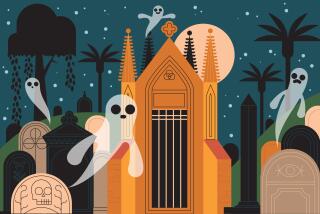Muslims in Los Angeles
- Share via
I was quite amused by Linda Blandford’s “Calling to the Faithful on Alien Shores” (Op-Ed Page, March 6). I think that she will be an enriching addition to The Times. But I was hoping that after she spent several hours in our center, she would have projected more than greyhounds, crabs, a pile of street-smart shoes, cheap flip-flops, aliens and those infamous “whiffs of the desert.”
While I admired her attempt to emphasize the human elements of Muslims, I also noticed that she unwittingly, and surely not deliberately, left the readers with an impression contrary to her “human interest” objective.
I must confess that I was personally amused with the description of my brother as a “stiff British colonel,” which does not exactly tantalize our ego, of my humble self as a “stately galleon which rolls from side to side,” and of the both of us as “the leaders” of the Islamic Center of Southern California, which is not true. Regardless the issue is beyond the personal projection.
Blandford indulged in zoological similes in describing Muslims. Ironically, after exposing the 11th Century Pope, Urban II, for describing Muslims as “dogs,” she saw them as “greyhounds” and “swaggering and scuttling crabs.” Knowing the standards of the British newspaper, the Guardian, and the refined language of several British writers, I felt that the language used in this article did not meet such standards and was quite condescending.
The depiction of Muslims coming to America as “people landing on alien shores” is a tragic oversimplification. Muslims have been in America since traders gave themselves the ungodly right of capturing Muslim slaves from Africa, after which they were used for the lucrative business of self-proclaimed masters. Since then Islam has been an integral part of these American shores.
Muslims do not consider this country as alien, but rather as a friendly one, inhabited by successive waves of immigrants who also came in pursuit of dreams and ideals.
Blandford switched suddenly at the end of the article to talk about the “whiffs of the desert that gave life to Islam.” As a matter of historical fact, it is Islam that gave life to the desert. The values of “courtesy from one man to another” and the tradition of hospitality are not the mere product of need, but the manifestations of the mercy of God.
I found the article warm, thought-provoking, and an eye-opener to our responsibilities: “The woods are lovely, dark and deep. But (we) have promises to keep, and miles to go before (we) sleep.”
MAHER HATHOUT
Arcadia
More to Read
Sign up for Essential California
The most important California stories and recommendations in your inbox every morning.
You may occasionally receive promotional content from the Los Angeles Times.













